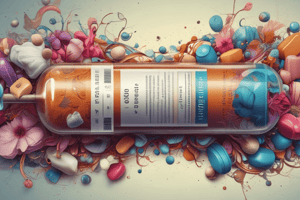Podcast
Questions and Answers
What is the maximum daily dose of acetaminophen for healthy adults being lowered to?
What is the maximum daily dose of acetaminophen for healthy adults being lowered to?
- 300mg/day (correct)
- 200mg/day
- 400mg/day
- 500mg/day
What is the primary indication for lidocaine transdermal?
What is the primary indication for lidocaine transdermal?
- Fever
- Inflammation
- Postherpetic neuralgia (correct)
- Mild to moderate pain
What is a common adverse effect of opioid therapy that can be prevented with adequate fluid and fiber intake?
What is a common adverse effect of opioid therapy that can be prevented with adequate fluid and fiber intake?
- Constipation (correct)
- Dyspnea
- Respiratory depression
- Orthostatic hypotension
What is the recommended antidote for acetaminophen overdose?
What is the recommended antidote for acetaminophen overdose?
What is the purpose of taking a thorough pain assessment before beginning therapy?
What is the purpose of taking a thorough pain assessment before beginning therapy?
What is the primary use of acetaminophen?
What is the primary use of acetaminophen?
What is a sign of respiratory depression?
What is a sign of respiratory depression?
What is the characteristic of chronic pain?
What is the characteristic of chronic pain?
What is the role of adjuvant drugs in pain management?
What is the role of adjuvant drugs in pain management?
What is feverfew used to treat?
What is feverfew used to treat?
What is the opioid ceiling effect?
What is the opioid ceiling effect?
What should patients be instructed to do before taking other medications or OTC preparations?
What should patients be instructed to do before taking other medications or OTC preparations?
What should be monitored in patients taking opioid therapy?
What should be monitored in patients taking opioid therapy?
What is a contraindication for the use of opioid drugs?
What is a contraindication for the use of opioid drugs?
What is a common adverse effect of opioid drugs?
What is a common adverse effect of opioid drugs?
What is the treatment for suspected acute opioid overdose?
What is the treatment for suspected acute opioid overdose?
What is the indication for using opioid drugs?
What is the indication for using opioid drugs?
What is the risk of using opioid drugs in patients with respiratory insufficiency?
What is the risk of using opioid drugs in patients with respiratory insufficiency?
What is the goal of continuously checking on a patient receiving opioid therapy?
What is the goal of continuously checking on a patient receiving opioid therapy?
What is a common adverse effect of long-term opioid use?
What is a common adverse effect of long-term opioid use?
What is Methadone Hydrochloride primarily used for?
What is Methadone Hydrochloride primarily used for?
What is the common adverse effect of Codeine Sulfate?
What is the common adverse effect of Codeine Sulfate?
What is the primary difference between physical dependence and psychologic dependence?
What is the primary difference between physical dependence and psychologic dependence?
What is the equivalent dose of morphine to 1 mg of IV Hydromorphone?
What is the equivalent dose of morphine to 1 mg of IV Hydromorphone?
What is the purpose of educating patients about making slower motions and dangling their feet on the edge of the bed when getting up?
What is the purpose of educating patients about making slower motions and dangling their feet on the edge of the bed when getting up?
What is the schedule of Oxycodone Hydrochloride?
What is the schedule of Oxycodone Hydrochloride?
What is the primary use of Nalxone Hydrochloride?
What is the primary use of Nalxone Hydrochloride?
What is the common result of chronic opioid treatment?
What is the common result of chronic opioid treatment?
What is the typical setting where Morphine Sulfate is most commonly used?
What is the typical setting where Morphine Sulfate is most commonly used?
What is the primary difference between Hydromorphone and Hydrocodone?
What is the primary difference between Hydromorphone and Hydrocodone?
Flashcards are hidden until you start studying
Study Notes
Types of Pain
- Acute pain: sudden onset, usually subsides once treated
- Chronic pain: lasts 3 months or more, persistent or recurring, often difficult to treat
Tolerance and Dependence
- Tolerance: physical adaptation to a drug, requiring higher doses for the same effect
- Physical dependence: physiological adaptation of the body to the presence of an opioid
- Opioid tolerance and physical dependence are expected with long-term opioid treatment
Adjuvant Drugs
- Assist primary drugs in relieving pain
- Examples: NSAIDs, anti-depressants, anti-convulsants, corticosteroids
- Gabapentin or pregabalin (anticonvulsants) are used for neuropathic pain
Opioid Ceiling Effect
- Maximum analgesic effect is reached, and increasing doses do not improve analgesia
- Examples: Pentazocine, Nalbuphine
Opioid Drugs
- Used to alleviate moderate to severe pain
- Indications: often used with adjuvant analgesic drugs to assist primary drugs with pain relief
- Used for cough suppression, treatment of diarrhea, and balanced anesthesia
Contraindications
- Known drug allergy
- Severe asthma
- Respiratory insufficiency, elevated intracranial pressure, morbid obesity, or sleep apnea
- Paralytic ileus
Adverse Effects
- Most serious: CNS depression
- Nausea and vomiting
- Urinary retention
- Diaphoresis and flushing
- Pupil constriction
- Constipation (in patients with severe opioid use)
- Itching
Management of Overdose
- Naloxone (Narcan): used for suspected acute opioid overdose, opioid-induced respiratory depression
- Naltrexone: used for alcohol and opioid addiction, comes in oral form
Withdrawal Symptoms
- Anxiety, irritability, chills, and hot flashes
- Joint pain, lacrimation, rhinorrhea, diaphoresis, nausea, vomiting, abdominal cramps, diarrhea, and confusion
Opioid Drugs
- Methadone: used for detoxification, can cause cardiac dysrhythmias
- Morphine Sulfate: used to treat severe pain, often used in hospital settings
- Codeine Sulfate: natural opiate alkaloid, often combined with acetaminophen
- Fentanyl: synthetic opioid, used to treat moderate to severe pain
- Hydromorphone (Dilaudid): schedule 2 drug, 1 mg of IV med is equivalent to 7 mg of morphine
- Methadone Hydrochloride (Dolophine): schedule 2 drug
- Oxycodone Hydrochloride: analgesic agent, structurally related to morphine, class 2
Non-Opioid Analgesics
- Acetaminophen (Tylenol): analgesic and antipyretic effects, little to no anti-inflammatory effects
- Dosage: maximum daily dose for healthy adults is being lowered to 300mg/day, 2000 mg for older adults and those with liver disease
- Contraindications: drug allergy, liver dysfunction, G6PD deficiency
- Overdose management: RECOMMENDED antidote is ACETYLCYSTEINE REGIMEN
Patient Education
- Inform patients to make slower motions and dangle feet on the edge of the bed to avoid orthostatic hypotension
- Contact physician immediately if vital signs change, patient condition declines, or pain continues
Nursing Process
- Assessment: perform a thorough history, obtain baseline vital signs and I&O
- Pain assessment: rate pain on a 0 to 10 or similar scale, using appropriate scale for age and cognition
Nursing Implications
- Medicate patients before pain becomes severe to provide adequate analgesia and pain control
- Pain management includes pharmacologic and non-pharmacologic approaches
- Patients should not take other medications OTC without checking with their physicians
- Instruct patients to notify physician about signs of allergic reaction or adverse effects
Opioid Nursing Implications
- Oral forms should be taken with food to minimize gastric upset
- Ensure safety measures, such as keeping side rails up to prevent injury
- Withhold dose and contact physician if patient's condition declines or vital signs are abnormal
- Monitor for adverse effects, therapeutic effects, and respiratory depression
Herbal Products
- Feverfew: related to the marigold family, anti-inflammatory properties, used to treat migraine headaches, menstrual cramps, inflammation, and fever
Studying That Suits You
Use AI to generate personalized quizzes and flashcards to suit your learning preferences.




